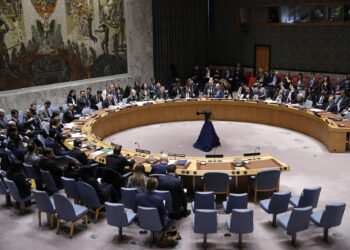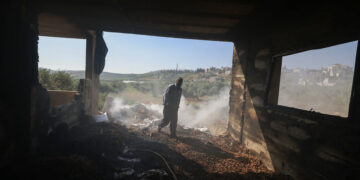Arwa Mokdad is a Peace Advocate with the Yemen Relief and Reconstruction Foundation.
With the outbreak of civil war in 2014, peripheral Yemen suddenly required analysts and observers to fill a gap in Western media coverage. This need grew after a coalition led by Saudi Arabia and the United Arab Emirates intervened militarily in Yemen in 2015 against Houthi rebels that had taken control of Sanaa and driven out Yemen's U.N.-recognized and Gulf-backed government. Despite a lack of knowledge of Yemen's history, culture and religion, many "experts" applied sweeping analysis, largely culled from international relations theory, to one of the oldest civilizations in the world.
The conflict in Yemen is highly nuanced and increasingly complex, with a constant stream of shifting alliances, all rooted in various intricate histories. Broad, sweeping statements about one side of the war or the other as only ever being rivals or enemies, and conjectural comparisons to other Middle Eastern countries and contexts to explain the current situation in Yemen are often misleading, at best. In certain corners of Western analysis, the war in Yemen is cast as a strictly sectarian conflict, pitting Shia Houthis against Sunnis, and a proxy war between Iran and Saudi Arabia—a dangerously narrow lens that ignores other aspects of the conflict and urgent realities in Yemen, like why the U.N.-brokered truce collapsed earlier this month and when the crippling, Saudi-led blockade of Yemen will end.
Yemen in general is an arduous place to study. It has a complicated history and tribal tradition that is difficult for Yemenis to understand, let alone outsiders. During my time working in Washington, I spoke to a range of professional Yemen analysts. I was struck by two common trends: elementary Arabic proficiency and a paltry amount of time actually spent in Yemen, if any. While they would boast of their favorite Yemeni dish, often mispronounced, with photos of the Old City of Sanaa hanging on the walls of their offices, many of these analysts made oversimplified generalizations about Yemen and excessively maligned Yemeni actors, particularly the Houthis.
Western biases and blind spots reveal themselves in English-language coverage of Yemen that consistently emphasizes sectarianism and geopolitics, while overlooking local dynamics and the historical roots of the conflict.
- Arwa Mokdad
We are often asked as Middle Eastern analysts about our biases, as if our white, Western counterparts are not biased themselves. I have even been told by an established Yemen expert not to wear traditional Yemeni dress at public appearances, in order to be "taken seriously." The implication, of course, is to not emphasize your Yemeni heritage, as that undermines your credibility. But my Yemeni ancestry influences my analysis—and that enhances my work. We cannot bemoan a lack of diversity in the field while punishing Middle Eastern analysts for their diverse perspectives and for not seeming sufficiently "detached," like their Western colleagues.
These Western biases and blind spots reveal themselves in English-language coverage of Yemen that consistently emphasizes sectarianism and geopolitics, while overlooking local dynamics and the historical roots of the conflict. Sectarianism in particular reveals little about the origins of Yemen's civil war. Pre-war, sectarianism was barely an issue in Yemen. Mosques were not separated by sect, and neither was the general populace. As Nabeel Nowairah wrote in Democracy in Exile, "Before this war, many ordinary Yemenis never cared about the different religious sects in their community, including their own. As I jokingly told a Yemeni friend recently, I was surprised when I came to find out that he was Zaidi. 'To be honest, I was surprised myself,' he replied."
However, as the war continues, sectarian divisions have emerged due to outside forces, as Saudi Arabia and the United Arab Emirates support certain Yemeni groups, and Iran increasingly backs the Houthis. Iranian influence in Yemen has become a self-fulfilling prophecy, with the Houthis deepening their relationship with Iran as this war drags on.
By dismissing such nuance, Western experts and observers inadvertently take sides in the conflict. The foreign policy establishment in Washington has firmly placed blame for any breakdown in negotiations—and, now, the collapse of the truce—on one party, the Houthis, who they appear to deem incapable of dialogue, despite all sides of the conflict committing war crimes and violating the brief, six-month truce. The Saudi-led blockade of Yemen—an active war crime that has created the largest humanitarian crisis in the world since it was imposed in 2015, by air, land and sea—is overshadowed in media coverage today by apportioning blame for violations of the truce, almost exclusively on the Houthis for their siege of Taiz. This is in spite of the fact that Saudi Arabia never fulfilled the commitments it made in the truce agreement, regarding the number of civilian flights permitted out of Sanaa's long-blockaded airport and the number of fuel ships allowed into the blockaded port of Hodeidah.
Such prevailing views from Western experts have the effect of normalizing the blockade itself, overlooking the cruelty and absurdity that Yemen, a sovereign state, must seek permission from a foreign country, Saudi Arabia, just so its population can have access to the bare essentials of food, fuel and medicine. They also divert attention from the fact that the blockade is a war crime and should be lifted immediately. In their painfully slow negotiations, the warring parties in Yemen haggle over a small number of fuel ships and a limited number of flights. What should be our rights as Yemenis—freedom of movement, the ability to leave the country for vital medical care, escaping collective punishment—are instead seen as bargaining chips for the countries that have waged war on Yemen and the foreign powers, like the United States, that have backed them.
Ending the war in Yemen will help counter the Houthis' growing radicalism—not continued enforcement of a Saudi-led blockade that is punishing average Yemenis and violates international law.
- Arwa Mokdad
Adding to the absurdity is that calling for restraint and peace often leads to accusations of being a Houthi. Whenever I speak out against the war and the blockade, I must preface my remarks with a disclaimer that I am not a Houthi, out of fear for my career as a Middle East analyst. Calling for diplomacy and restraint does not make me a Houthi, and any suggestion otherwise is both egregious and plays on Islamophobic tropes. Unfortunately, such baseless accusations are too common in Yemen discourse. Advocating for peace and dialogue should not seem radical, but rather be the norm.
So much Western analysis and "expertise" on Yemen seems to forget the crux of the issue at hand: Yemen itself. Not a proxy war between Riyadh and Tehran, or fearmongering about the Houthis being an extension of Hezbollah, but the reality of what is happening on the ground in Yemen and why. As the war goes on, the Houthis become more and more insular, and the most conservative elements within the party gain power. Ending the war in Yemen will help counter the Houthis' growing radicalism—not continued enforcement of a Saudi-led blockade that is punishing average Yemenis and violates international law.
Unfortunately, the fragile truce has already fallen apart, and Washington-based experts are pointing fingers again. But the delicate nature of the truce demonstrates the fundamental reality that a lasting cease-fire cannot be achieved without lifting the blockade. Maintaining the blockade for the past seven years as leverage has not benefited the Saudi-UAE coalition; it has only punished Yemen's population. De-linking the blockade from negotiations could instead lead to more productive dialogue between the warring parties that does not hold an entire country hostage.
Too many Western analysts continue to overlook the humanitarian and security consequences of the blockade at the cost of Yemeni lives, whether by buying into concerns over exaggerated Iranian influence in Yemen or the dominant narrative from Riyadh that the Houthis are the sole perpetrator of the conflict and must be countered militarily at all costs—a view that Saudi and other Gulf lobbyists have effectively cultivated in Washington.
Over the past three decades of disastrous American foreign policy in the Middle East, we have witnessed—personally for those of us with family ties to the region—the dire humanitarian and security consequences of isolating states through sanctions and blacklists. Yet the war hawks keep circling. Sustained diplomacy and a concerted effort toward peace are the only solutions that will temper radicalization among the country's warring factions and pave the way for the emergence of an equitable state for all Yemenis.





































